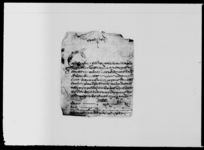A purjī from the Hanumān Nagara Aminī Gosvārā to Caudharī Rāmalāla of Khālīsā requesting provisions for Dasaĩ (VS 1952)
ID: E_3456_0041
Edited and
translated by Rajan Khatiwoda and Astrid Zotter
Created: 2017-08-16;
Last modified: 2018-02-08
For the metadata of the document, click here
The accompanying edition, translation/synopsis and/or commentary are available under the terms of the Creative Commons Attribution-ShareAlike 4.0 International License
Abstract
This purjī, issued from the Hanumān Nagara Aminī Gosvārā to Caudharī Rāmalāla of Khālīsā, directs the addressee to send items (he-goats, ghee, oil etc.) necessary for the Dasaĩ rituals. It further assures the addressee that a reasonable price for the articles will be reimbursed.Diplomatic edition
[1r]
1श्री\1श्रीकम्यांडरईनचीफ2१[unknown seal][unknown signature]1स्वस्तिश्रीहनुमांनगरअंमीनीगोस्वाराकस्य•प्रगंनाषालीसाकाचौध
2रीरामलालकेपुर्जीउप्राँन्त•तीम्राईलाकाभर•मालकठ्महाल•अमि
3नीअदालत•वनजाँचसमेतलाई•सावीक•वमोजीम्५२सालकोवडा
4दसै•कोपुजागर्नुगराउनुभंन्या•¯ ¯ १¯साहेववाट५२सालभाद्रसुदि
5२रोज५मा•येसअडाकाहाकींकानाउमावडापत्रवक्सभैआउदासा
6वीकवमोजिम्•सोवडादसैकोपुजा•गर्नालाई•तपसीलवमोजीम्को
7मालहरुचाहीदा•पुर्जीलेषीपठायाकोछतसर्थ•योपुर्जिपुग्नीमा
8त्रसोलेषियाकोमा•लयेसअडामापठाईदीन्याकामगरसोमा
9लकोसुपत्मोलमीलनेछ•सोमालवेगर•हर्जाहुननपाव़स्
10तपसिल•
11——-
[table]
12वोकाव़टा• | २ | घ्यूसेर | ६२ | |
13तेलसेर | ९२ | x x | x |
14——-
15इति सम्वत्१९५२सालमिति•आश्वीनवदि७रोज४शुभ्म्¯¯¯¯
Translation
[1r]
Venerable Commander-in-Chief1
1
[unknown seal]2
Hail! [This is a] purjī from the Aminī Gosvārā of Hanumān Nagara to CaudharīRāmalāla of Khālīsāpragannā.
Uprānta: Inasmuch as a baḍāpatra issued by [our] master, [the Venerable Commander-in-Chief],3 arrived on Thursday, the 2nd of the bright fortnight of Bhādra in the [Vikrama era] year [19]52, to the chief of this office, stating: “Perform [and] have performed worship (pūjā) as usual [on the occasion] of Baḍādasaĩ of the year [19]52 throughout your administrative territory, including for the mālakaṭhmahāla,4 the aminī [and] adālata [courts?] and the banajā̃ca [office]”, [and] inasmuch as the items given in the particulars (tapasila) are required as usual to carry out the worship during the said Baḍādasaĩ festival, [this] note (purjī) has been written and sent [to you]. Therefore, as soon as this purjī arrives, fulfil the task of sending these items written [below] to this office (aḍḍā). You will certainly receive an appropriate price [as compensation] for these items. May there be no failure (harjā) [arising from having the rituals performed] without these items.
Particulars
[table]
| He-goat | 2 | ghee sera | 62 | |
| Oil sera | 92 | x x | x |
Wednesday, the 7th of the dark fortnight of Āśvina in the [Vikrama] era year 1952 (1895 CE). Auspiciousness.
Commentary
The document orders the local headman (caudharī) to provide items, including sacrificial goats, for carrying out the Dasaĩ rituals in state offices. Interestingly, though the caudharī is promised monetary compensation for the items provided, no concrete sums are specified; rather the document resorts to the typical phrase: to pay an "appropriate price" (supat mola).
The recipient of the purjī is the caudharī of the Khālīsā pragannā, his name being given as Rāmalāla. Possibly, he was a descendant of Ranapala Caudharī and Hema Caudharī who had held the post of headman over Khālīsā under the Makwanpur King Mahīpati Sen and the early Śāha rulers respectively. On this office, its holders, and the administrative units attached, see the series of documents published by Krauskopff and Meyer (2000: 29-31, 115-134, doc. nos. 1-17). The present document seems to come from the same collection as these latter ones, judging by the name of its owner, Bijali P[rasa]d Chaudhari.

